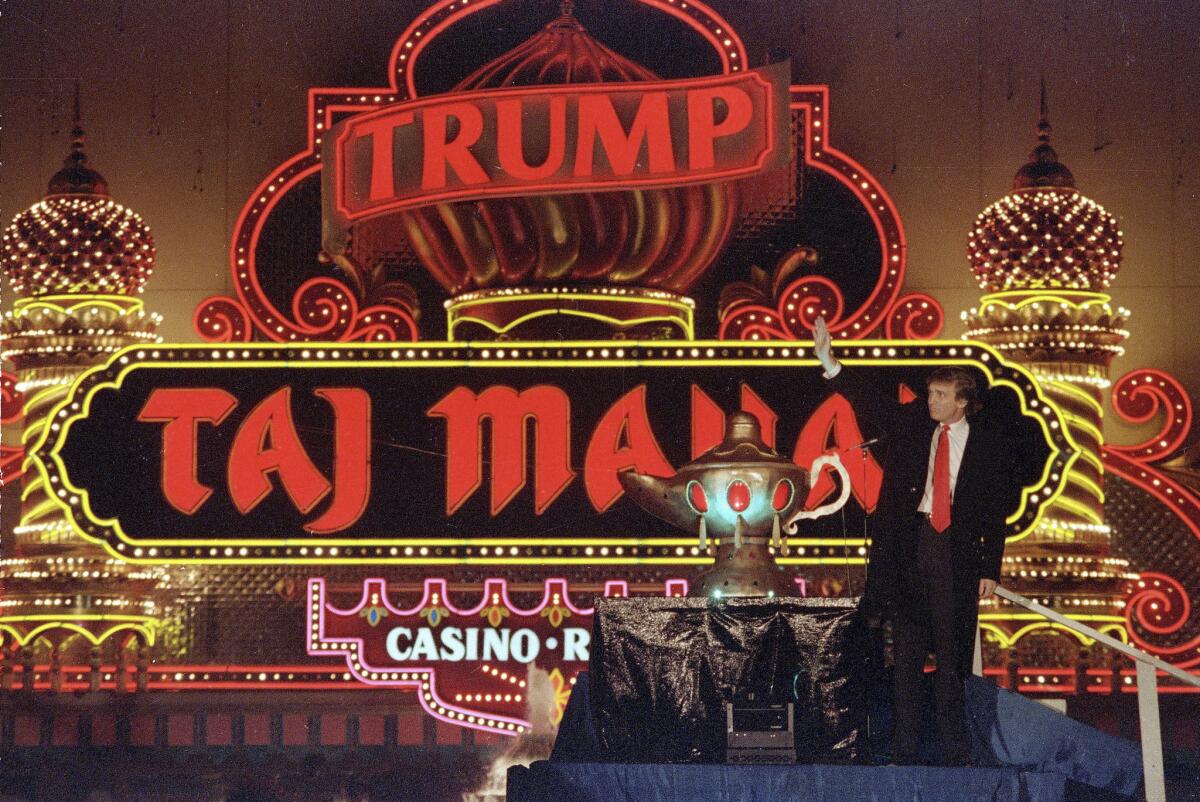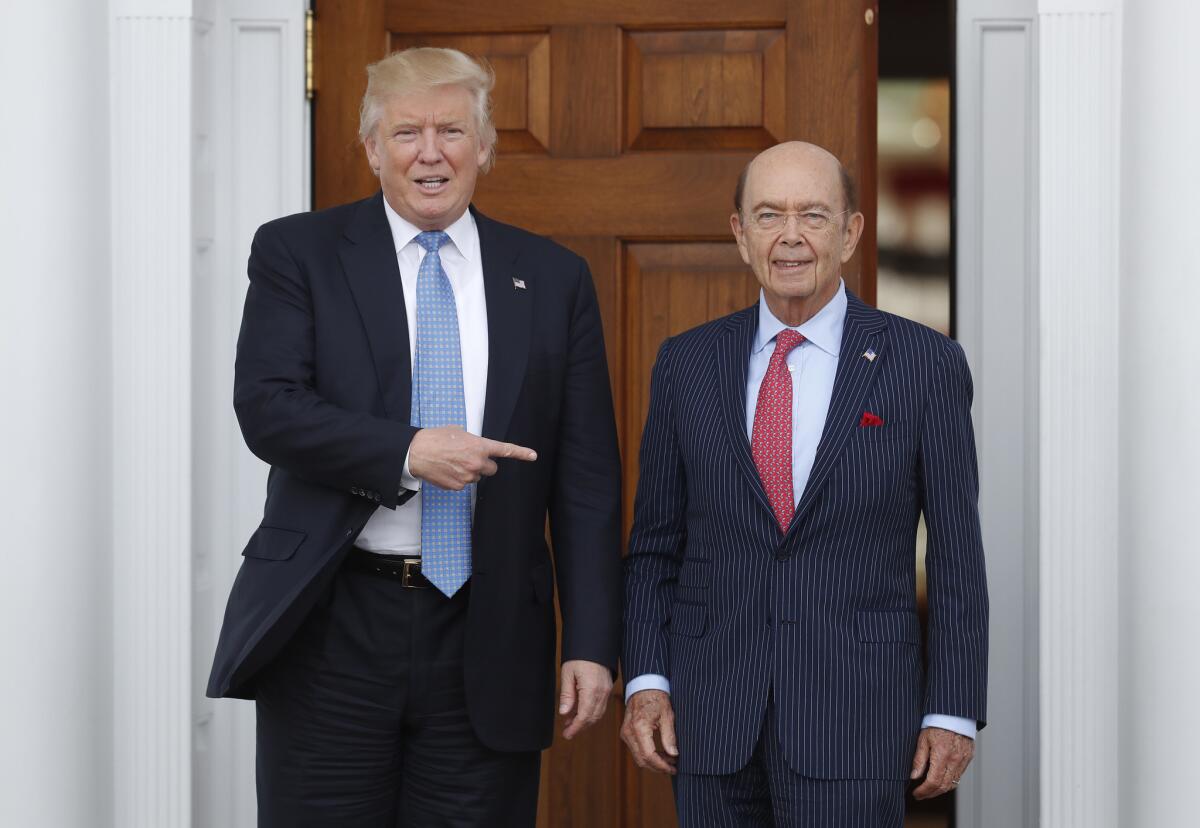Meet Wilbur Ross, who once bailed out Trump in Atlantic City and is now his pick for Commerce secretary

Wilbur Ross is Donald Trump’s nominee to be the Commerce secretary. Here’s some background on Ross.
- Share via
Wilbur Ross became rich investing in faltering businesses like steel mills and coal mines, finding a fortune in blue-collar industries that others dismissed as beyond saving.
But before he was scooping up Rust Belt factories, the banker was sizing up another troubled asset: Donald Trump. More than two decades ago, Ross represented bondholders who were gunning for Trump after he failed to pay back the high-interest loans he had taken out to build his casino empire.
For the record:
3:04 a.m. June 23, 2019A earlier version of this article listed House Majority Leader Kevin McCarthy’s party affiliation as Democrat. He is a Republican.
When Ross arrived in Atlantic City, N.J., for negotiations in 1990, he found a throng of journalists and curious onlookers eager to catch a glimpse of Trump, according to “The Vulture Investors,” by Hilary Rosenberg. For the quiet Ross, the scene inspired a revelation: Trump’s flashy image had resilience.
Ross embarked on a strategy that helped Trump avoid a personal bankruptcy that could have derailed his unlikely trajectory from real-estate mogul to reality television star to president-elect.
Consider it another investment that has paid off for Ross, whom Trump recently tapped to lead the Department of Commerce. A private equity billionaire who once led a secret Wall Street fraternity, Ross is among the rich, loyal insiders Trump picked for a Cabinet that is shaping up as the wealthiest in history.
If confirmed by the Senate, the 79-year-old veteran investor will spearhead trade policy and business development in the new administration.
Trump rejected criticism that Ross was too out of touch to serve, saying during a rally last week in Cincinnati that Ross was chosen because “this guy knows how to make money, folks.”
Trump added, “I put on a killer.”
Ross, however, once spared Trump.
The future president-elect at one time owned a quarter of Atlantic City’s casino market. But Trump was heavily in debt, and he started missing bond payments on his — and Atlantic City’s — largest casino, the Taj Mahal, in 1990.

Ross, then an investment banker working for Rothschild Inc., helped bondholders negotiate with Trump, whose finances were unraveling. The final deal reduced Trump’s ownership stake in the Taj but left him in charge, and bondholders were unhappy when Ross presented the plan.
“Why did we make a deal with him?” one asked, according to Rosenberg’s book.
Ross insisted that Trump was worth saving.
“The Trump name is still very much an asset,” he said.
Trump himself proved to be less of a sure bet. Though the agreement allowed Trump to soldier on in Atlantic City, his casinos landed in bankruptcy court twice more.
The president-elect respects Ross’ deal-making skills, said Jason Miller, the communications director for Trump’s transition team.
“He’s seen Mr. Ross up close and personal,” Miller said. “He knows that he can depend on him.”
Ross grew up in New Jersey and attended a Jesuit prep school in New York before earning degrees from Yale and the Harvard Business School. He spent two decades at Rothschild working on bankruptcies before starting his own private equity firm, WL Ross & Co., in 2000.
A Palm Beach, Fla., resident who owns an art collection valued at nine figures and is worth an estimated $2.5 billion according to Forbes, Ross earned a reputation as a so-called vulture investor for finding profits in dying businesses. Ross described himself differently in an interview with New York magazine: “We’re a phoenix that rebuilds itself from the ashes.”
At the Commerce Department, Ross would oversee a portfolio containing responsibilities as diverse as weather research and promoting minority-owned businesses. However, with Trump in the White House, foreign trade likely will be the issue that gets the most of Ross’ attention. Trump has promised to remake free-trade deals.
Follow live coverage of the presidential transition on Trail Guide »

The department has wide latitude to determine when other countries are violating trade rules, experts said, allowing U.S. officials to slap tariffs on imports or find loopholes in international agreements.
The Trump administration won’t rush toward tariffs but wants to renegotiate some deals, Ross told CNBC after he was tapped by Trump.
“We’ve been doing a lot of dumb trade,” he said, echoing Trump’s campaign-trail rhetoric.
Trump’s pronouncement that companies that leave the U.S. will face a 35% tariff on goods they want to sell domestically has been met with a tepid response from his fellow Republicans. GOP leaders on Capitol Hill suggested this week that they would not go along with such a proposal, though they emphasized that they would wait to hear exactly what Trump had in mind.
“Take a deep breath. He’s not sworn in yet,” House Majority Leader Kevin McCarthy (R-Bakersfield) told reporters. “Let’s not predetermine what the outcome of this stuff is.”
Even Trump’s vice president-elect, Mike Pence, deflected when asked repeatedly on MSNBC whether he agrees with the proposed tariff.
“What we don’t want to do is for companies to say it cost — it costs this much to manufacture it overseas and sell it in the United States and it costs this much in taxes and regulations and other burdens to manufacture here,” Pence said Tuesday on “Morning Joe.”
Ross, though, helped formulate Trump’s economic policies, which include tax cuts, reduced regulations on energy production and privately financed infrastructure spending spurred by tax credits.
Peter Navarro, a UC Irvine professor who worked with Ross on the proposals as a Trump adviser, praised Ross for his “precision, compassion, humility and subtle humor.”
“Donald Trump continues to choose very well for America,” Navarro said.
A report from Moody’s, however, predicted that Trump’s plans would lead to a recession, while the Tax Foundation projected that deficits would increase, conclusions that Navarro and Ross have dismissed.
House Minority Leader Nancy Pelosi (D-San Francisco) slammed Trump’s choice of Ross. Democrats have no power to block his eventual nomination.
“Choosing a practiced corporate raider to head the Commerce Department reflects Republicans’ disdain for hard-working Americans struggling to make ends meet,” she said in a statement. “With sprawling conflicts of interest and a troubling record on worker safety, Democrats have serious concerns that Wilbur Ross’ corporate interests will trump the concerns of American families, entrepreneurs and our economic security.”
Her reference to worker safety was particularly damning. Ross’ private equity fund bought financially troubled coal operations several years ago, and in West Virginia, one of them, the Sago mine, suffered a collapse that killed a dozen people in 2006.
Miller defended Ross’ response to the blast, noting that Ross raised money to help families of the victims and invested in better mining safety.
Ross’ record with steel companies is less controversial. Under the banner of the International Steel Group, he acquired mills on the verge of being shuttered when their owners fell into bankruptcy. The company became the largest producer of steel in the country, and Ross sold the operations for $4.5 billion two years after he entered the industry.
Despite his Wall Street background, Ross had a good relationship with labor. Leo Gerard, president of the United Steelworkers, said that his exchanges with Ross weren’t “peaches and cream,” but he was open to workers’ concerns.
“Lots of these folks are bottom-feeders. They come in, and they strip the assets,” Gerard said of other investors. “Wilbur went the other way.”
Twitter: @chrismegerian
ALSO:
Trump to preside over the richest Cabinet in U.S. history
Trump says he saved American jobs, but he hasn’t shown how he can turn the victory into policy
Step by step, Trump is assembling an administration far more conservative than his campaign
More to Read
Get the L.A. Times Politics newsletter
Deeply reported insights into legislation, politics and policy from Sacramento, Washington and beyond. In your inbox twice per week.
You may occasionally receive promotional content from the Los Angeles Times.











